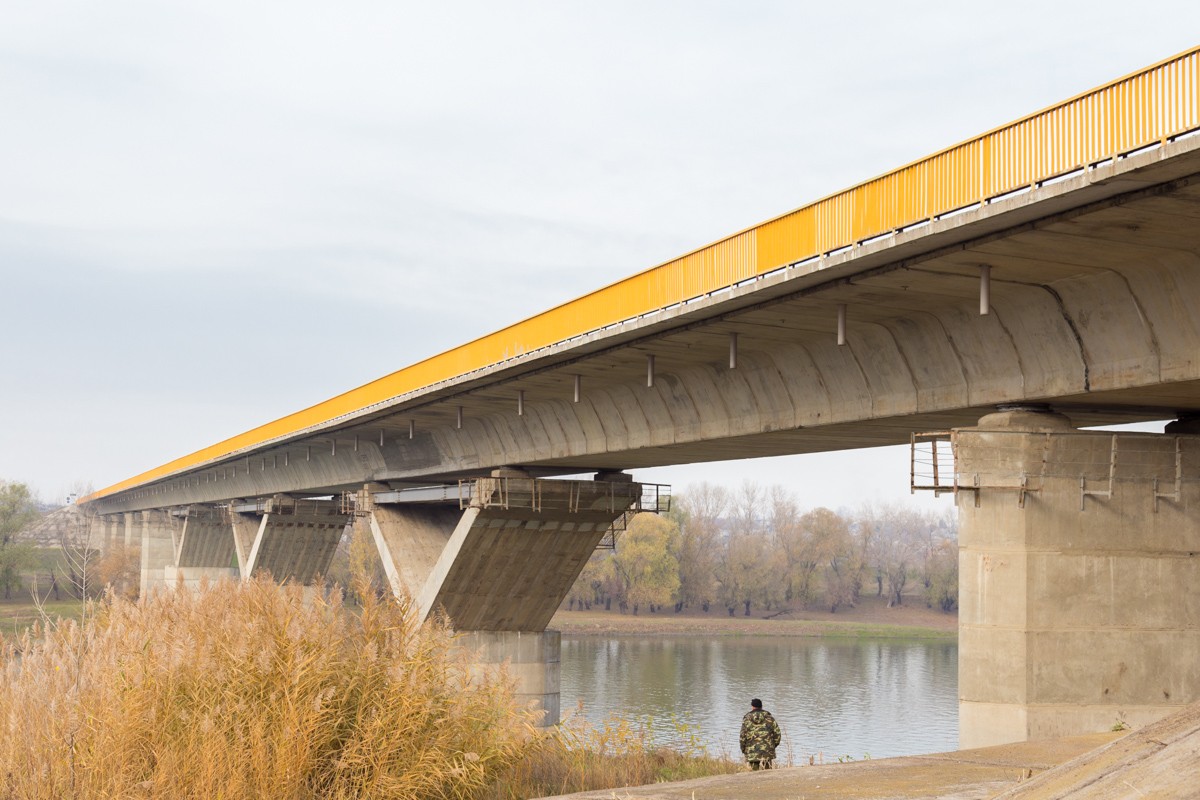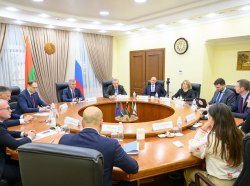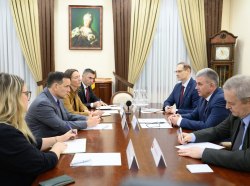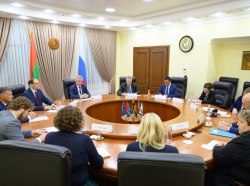The bridge across the Dniester in the area of Bychok settlements (PMR) and Gura-Bikului (RM) has been open to traffic not only for cars, but also for heavy vehicles for a year now. The opportunity to fully use this infrastructure facility appeared in Tiraspol and Chisinau after the signing of the protocol decision of November 3, 2017. Until this, the bridge topic had been listed in the negotiation agenda for more than 20 years.
What allowed the parties to shift the dialogue from the discussion stage to the decision stage, what significance this event had in general for the negotiation process – all that was told to the IA Novosti Pridnestrovya in the Pridnestrovian Ministry of Foreign Affairs.
Initiative of Pridnestrovie
The bridge between the villages of Gura-Bikului and Bychok was blown up during the military actions on the Dniester in 1992. In the early 2000s, it was restored with funds from international donors, and according to experts even minimal redecoration would be enough for the full-fledged operation of this infrastructure facility. But the movement on the bridge was not resumed due to constant disagreements on this issue between Chisinau and Tiraspol.
“Since 2001, the Moldovan side has refused to assume that the bridge will never be used for military purposes after its opening. The Pridnestrovian side insisted that those obligations be recorded in the final document with reference to the previously reached agreements. In particular, to the 1998 agreement “On security guarantees in the use of restored bridges across the Dniester River”. But for many years it hasn`t been possible to sign the corresponding protocol decision” - Pridnestrovian foreign office told.
The topic of the bridge was updated again only in 2017. After inspecting the object, President of Pridnestrovie Vadim Krasnoselski declared his readiness to conclude an agreement and open traffic on the bridge with the guarantee that the crossing would not be used for military purposes.
The proposal of the President was sent both to Moldovan side and to all the participants in the “5+2” negotiation format, after which the parties started to harmonize a final document (protocol decision).
On November 3, 2017, in the Chisinau office of the OSCE Mission, political representatives from Pridnestrovie and the Republic of Moldova, Vitaly Ignatiev and Georgy Belan signed a protocol decision “On the opening of a bridge across the Dniester River in the villages of Gura-Bikului and Bychok”.
Enhancing dialogue
This event, both in political and expert circles, was called a breakthrough and was perceived as a step towards the resumption of negotiations on other long-standing issues.
It did not take long to see the results. Pridnestrovie and Moldova concluded four agreements designed to solve problematic issues in the field of telecommunications and communications, recognition of Pridnestrovian higher education diplomas abroad, work of schools with Moldovan language based on Latin graphics and the use of agricultural land in the Dubossary region of Pridnestrovie by Moldovan farmers.
“Basically, this [agreement on opening the bridge] was a certain maneuver that allowed the parties to understand that we can agree on specific issues and move forward. Following the signing of the agreement on the bridge opening, on 25 November we were able to conclude a number of agreements of the negotiation process. They have different degrees of implementation, but the protocol decision on the bridge as a whole is implemented” - the Foreign Ministry reported.
The element of mutual trade promotion
In addition to diplomatic importance, the opening of Bychok-Gura-Bikului bridge is of great economic importance. There runs the international highway M-14, which is part of the European road route E-58 (Vienna-Uzhgorod-Chisinau-Odessa-Rostov-on-Don) through the bridge. Before the opening of the bridge across the Dniester, heavy load vehicles went from Moldova through Tiraspol and Bendery, significantly complicating the traffic through the cities. The opening of the bridge allowed to redirect a significant part of transport bypassing in Bendery, Parkan and Tiraspol and contributes to the preservation of road infrastructure. Moreover, it provided additional opportunities for the transit of goods through Pridnestrovie, as well as for Pridnestrovian exports through Moldova.
It should be reminded, that at first the mass of vehicles allowed to move on the bridge was 3.5 tons. In February of this year, after determining the technical condition of the object and the entrances to it, the movement of vehicles with an actual weight of up to 10 tons was allowed on the bridge.
The Foreign Ministry paid attention to the fact that the bridge was opened as an object that can become an element of encouraging mutual trade, in general, trade and economic interaction between Pridnestrovie, Moldova, Ukraine, and in a wider regional context.
Now the Pridnestrovian side is in favor of making a decision that will let heavy trucks weighing over 10 tons be allowed to cross the bridge. But to do that it is necessary to carry out repairs.
“This summer a specialized company of the Republic of Moldova for the European Union grant conducted analysis of the roadway and access roads. Pridnestrovian side does not yet have information on the results of this instrumental analysis, but we expect to receive it in the near future. The completion of this instrumental inspection, as we believe, will make it possible to achieve immediate repair work and launch a full-fledged traffic on this object in the future” - the diplomacy explained.
The ambitions of Moldovan side
Shortly after the launch of traffic on the bridge, Pridnestrovie and Moldova improved the infrastructure and conditions of service at their customs and border posts. But if Chisinau could build an additional trailer and increase the number of representatives of the border police, then similar actions of Tiraspol were issued for the intention to build a full-fledged customs terminal and considered it a violation. Moreover, the same clause on guarantees of non-use of the bridge for military purposes, on which Pridnestrovian side has insisted all these years.
“Now Moldovan side is trying to turn this point upside down and say that our [Pridnestrovian] posts are just preventing the fulfillment of that guarantee. But traditionally, even when only pedestrian traffic was allowed on the bridge, there was a stationary customs and border migration post. And now there are unarmed employees of specialized structures of Pridnestrovie. That is, there is nothing that would be associated with military objectives” - the Ministry of Foreign Affairs stated.
The presence of Pridnestrovian posts around the bridge is so annoying to the Moldovan delegation that this issue was included on the agenda of Joint Control Commission. The Foreign Ministry emphasizes: the question does not in any way affect the competence of the JCC. Obviously, Chisinau hopes to achieve relaxation in the mode of crossing the Moldovan-Pridnestrovian border, and the bridge is the first sign.
“The stumbling block is the politicized ambitions of the Moldovan side. They got false impression that the opening of the bridge would entail the elimination of Pridnestrovian state border in this narrow area with a view to making the border more percolating in other directions” - Pridnestrovian foreign service stressed.
Now the question of the posts functioning is not being discussed in the JCC - it was agreed to return to it at the extraordinary meeting of the body, on the condition of a common solution achievement by the parties. In the meantime, the Moldovan side continues to insist on its requirements in relation to the post infrastructure.








